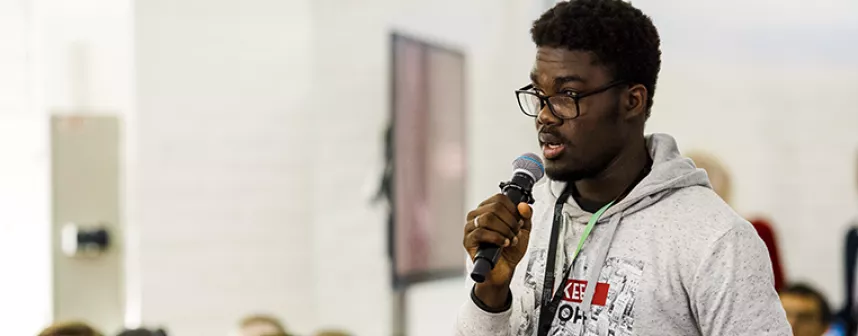Overcoming language barriers in Africa: Student at Jacobs University develops translation program
October 19, 2020
If you ask Alexa or Siri whether they speak Fon, the two language assistants from Amazon and Apple express their incomprehension. Even translation programs such as Google Translate hardly know any African languages. Bonaventure Dossou, who is studying for a master’s degree in Data Engineering at Jacobs University Bremen, wants to change that. Together with his friend Chris Emezue, he has developed a translation software – in order to better understand his mother.
Fon is spoken in Benin, Bonaventure’s country of origin, as well as in parts of Nigeria and Togo. The official language in Benin, a state with 14 million inhabitants in West Africa, is French, the language of the former colonial power. Bonaventure speaks this language perfectly. At school as well as with his father, he only spoke French. "My Fon therefore got rusty over time, but that is the only language my mother speaks," explained Bonaventure. When he moved abroad for his studies, he did not always fully understand the voice messages she sent him. "Sometimes I had to ask my sister for a translation."
This breakdown in communication between mother and son was the starting point for a project that could lead to a better understanding on the African continent. Together with Chris, Bonaventure developed a translation software. The two of them met at the Kazan Federal University in Russia, where they studied mathematics. Both moved to Germany after they completed their bachelor’s degrees with distinction. Chris went to the Technical University of Munich, Bonaventure to Jacobs University. He has been in Bremen since the end of August to complete his two-year master program in Data Engineering. "This is a great program. I particularly enjoy the exchange with the teachers and students from all over the world," he said, explaining his decision.
Bonaventure and Chris started developing their translation software in Russia. It works with an artificial intelligence (AI). "We told ourselves: Let's do something that has never been done before," said Bonaventure. The problem: Like most of the approximately 2,000 African languages, Fon is not a written language. There are only a few texts to feed the software with words, grammar and syntax. "But for translation algorithms and machine learning, you need data. The more, the better," Bonaventure said.
The duo received their first data from the "Masakhane Community", an online community of researchers working to promote African languages by using AI. The first dataset consisted of Bible texts written by Christian missionaries. "It had little to do with daily conversation," said Bonaventure with a laugh. The programming proved to be challenging, partly because there are over 50 different dialects of Fon. Although the Latin alphabet is used for the language, a graphic accent can be enough to give a completely different meaning to a word.
"We now have over 25,000 data records. For one language, this is very, very little," said Bonaventure. "But we do what we can." His platform is still under development and is scheduled to go online next year – with a function that will allow anyone to add their own translations. This is possible because the 23-year-old, together with two friends, Fabroni Yoclounon and Ricardo Ahouanvlame, has developed a mobile keyboard for African Languages that is available in the Google Play Store. A mobile application is also planned for the translation software.
The project has already begun to bear fruit. The duo was invited to present their work at two of the world's largest conferences on AI and computational linguistics: the "International Conference on Learning Representations" in Addis Ababa, the capital of Ethiopia, and the "58th Computational Linguistics (ACL)" in Seattle, USA. Bonaventure gave a presentation on the possibilities of machine learning in the translation of African languages at the "AI Expo-Africa", the largest AI conference for companies on the continent.
Bonaventure is convinced that AI and machine learning can also make a significant contribution to overcoming language barriers in Africa. "In many African countries the situation is the same: English, French or Portuguese is spoken, while the native languages are not promoted. Some are threatened with extinction."
“I want to help put Africa on the AI map”, Bonaventure said. "With some modifications, our platform can be transferred to other African languages." The duo is already working on a version that will allow users to communicate between Fon and Igbo, a language widely spoken in Nigeria. So far, no African language is supported by the providers of language assistance systems. Only Google Translate takes some of them into account.
The 23-year-old still receives voice messages from his mother. However, she now uses the Fon keyboard. "This has brought us even closer together. Our communication has really improved."
Last but not least, Bonaventure has one wish: "I would like to network with other people interested in AI in Bremen.”
Bonaventure Dossou on Social Media:
Instagram: @bona.dossou
Twitter: @bonadossou
Facebook & LinkedIn:
Bonaventure DOSSOU
Read more about Bonaventure: Lanfrica: A Database for African Languages developed by a Student of Jacobs University
This text is part of the series "Faces of Jacobs", in which Jacobs University introduces students, alumni, professors and staff. Further episodes can be found at www.jacobs-university.de/faces.
